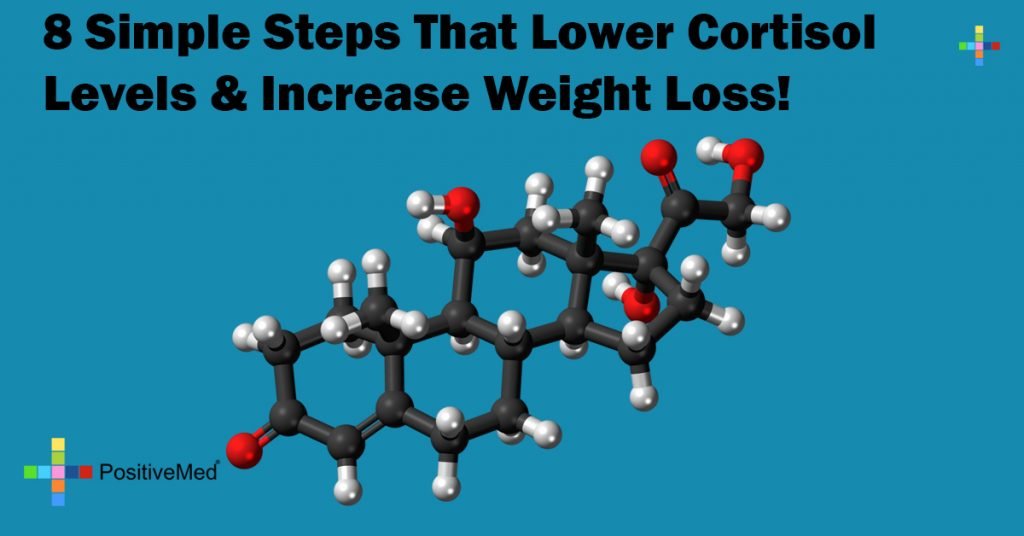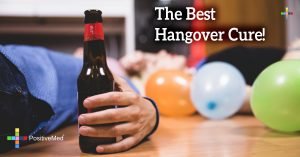
8 Simple Steps That Lower Cortisol Levels & Increase Weight Loss!
By PositiveMed-Team
Edited By Stephanie Dawson
What is cortisol? Cortisol is the primary stress hormone secreted by the 2 cap-sized glands that are located on top of your kidneys in response to stress. It has been described as a low-grade adrenaline.
This hormone to assists in “fight-or-flight” situations. Its job is to quickly convert stored energy sources in the body into usable energy. Today, as a society, we are stressing over bills, going to work, relationships, poor food choices, dehydration, overtraining with exercise, lack of adequate sleep, among others. Every time the body becomes stressed, cortisol is released.

This chronic elevation in cortisol is extremely detrimental to a person’s health. It has been linked to, but not limited to, weight gain, adrenal fatigue, hormonal imbalances, heart disease, excessive blood sugar levels, and elevated cholesterol.
Other unwanted side effects of elevated cortisol levels include excess body fat, particularly around the midsection, and depressed sex hormone levels, which kills the love- drive. It also breaks down muscle tissue, which can really hinder results from exercise and even reverse them if the exercise is not strenuous enough.
Cortisol is naturally secreted in the body on a schedule throughout the day. The peak of which is at about 8am, signalling the body it’s time to get out of bed and start the day. Throughout the day, cortisol levels steadily drop and reach their lowest at about 8-10 pm, to ready the body for restorative sleep. A cortisol rhythm that is disrupted by chronic stress, both mentally and physically, can impair one’s ability to fall asleep or even stay asleep.

Ways to Reduce Cortisol Naturally
1. Use cortisol reduction supplements: Holy Basil, Golden Root, magnolia, vitamin C, phosphatidylserine, glutamine, and rhodiola rosea. Also vitamin B5 and folic acid can help lower cortisol levels. They can be found in foods like fish, beans, whole grains, and sunflower seeds.
2. Eat at regular intervals throughout the day: Avoid skipping meals, as this will create a cortisol release.
3. Eat “right,” including plenty of fruits and vegetables. Low-glycemic index foods like eggs help lower cortisol levels in the blood while whole grain products help proteins control the production of cortisol in the body. Excessive carbohydrate intake creates cortisol release in response to constantly elevated insulin levels.
4. Use stress reduction techniques whenever feeling overwhelmed: meditation, self-hypnosis, or simply lying on the floor for 20 minutes while focusing on breathing. Get outside, if at all possible.
5. Avoid stimulants: Stay away from energy drinks that contain ephedra-like compounds and caffeine. Stimulants shift the body into sympathetic dominance, ie. “fight or flight”. Stimulants can also disrupt your sleeping patterns. If you must have your daily coffee, be sure that you do not drink any in the afternoon.
6. Keep workouts under 1 hour: At the 1 hour mark, testosterone levels begin to decline and cortisol levels rise. Forty-five minute workouts are even better.
7. Do not overtrain: training more than 2 days in a row will overtax the hormonal system and therefore increase cortisol levels. If the body doesn’t feel recovered from the previous workout, take an extra day off or reduce the number of sets.
8. Get to bed on time. For those who work night shifts or have irregular hours, invest in black-out curtains and attempt to keep the same kind of sleep/awake schedule you would have if you worked during the day.





